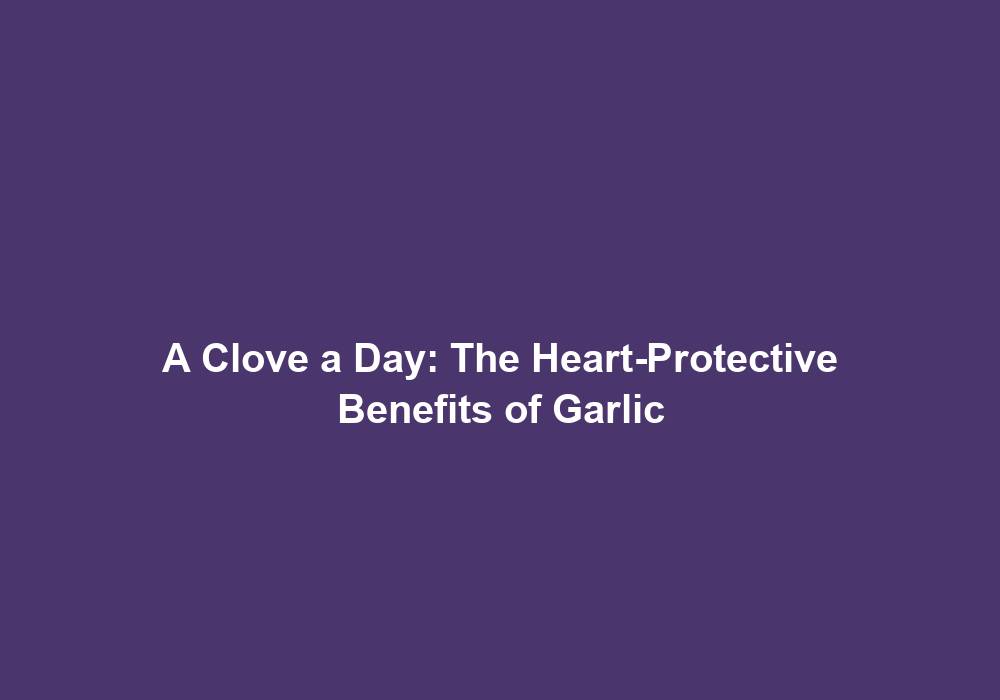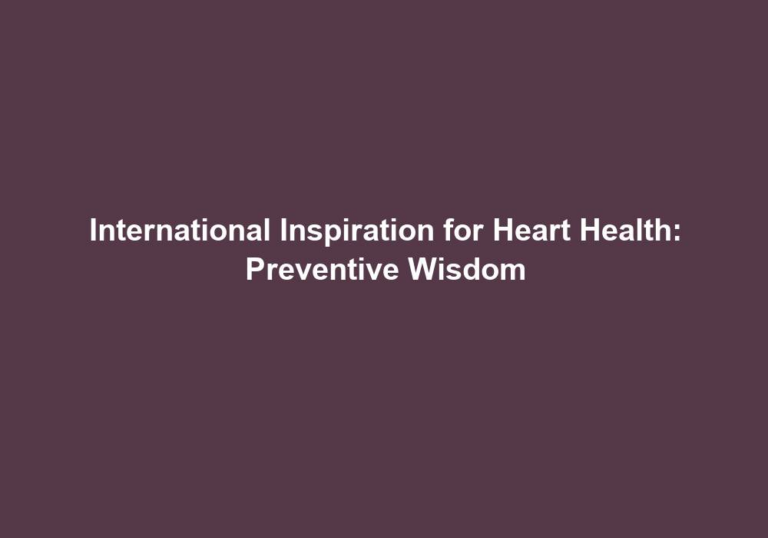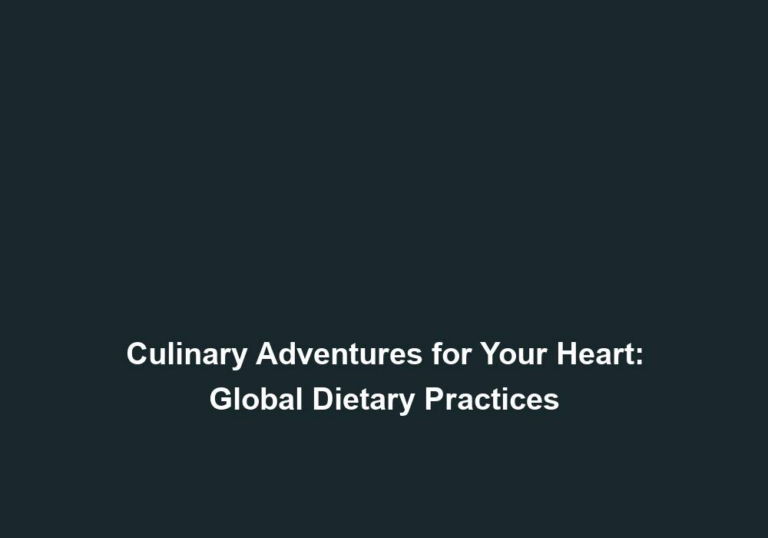A Clove a Day: The Heart-Protective Benefits of Garlic
Garlic, a staple ingredient in countless cuisines around the world, not only adds flavor to dishes but also offers a wide array of health benefits. Dating back thousands of years, garlic has been highly regarded for its medicinal properties, particularly its heart-protective effects. In this article, we will explore the various ways in which garlic can benefit heart health and how you can incorporate it into your daily routine.
The Power of Allicin
One of the key components responsible for garlic’s heart-protective benefits is allicin. Allicin is a sulfur compound that gives garlic its distinctive aroma and taste. It possesses powerful antioxidant and anti-inflammatory properties that can support cardiovascular health.
Lowering Blood Pressure
High blood pressure is a major risk factor for heart disease. Studies have shown that regular consumption of garlic can help reduce blood pressure levels. Allicin promotes the production of nitric oxide in the body, which relaxes and dilates blood vessels, leading to improved blood flow and a decrease in blood pressure.
Garlic is an excellent natural remedy for lowering blood pressure due to its ability to relax blood vessels and improve blood flow. The allicin compound in garlic promotes the production of nitric oxide, a molecule that helps to dilate blood vessels and reduce blood pressure. By incorporating garlic into your daily routine, you can potentially lower your blood pressure and reduce the risk of heart disease.
In addition to allicin, garlic also contains other compounds that contribute to its blood pressure-lowering effects. These compounds include adenosine, which helps to relax blood vessels, and gamma-glutamylcysteine, which helps to regulate blood pressure. By consuming garlic regularly, you can harness the power of these compounds and improve your heart health.
Furthermore, garlic has been shown to have a mild diuretic effect, which means it can help to eliminate excess fluid from the body. This can also contribute to a reduction in blood pressure, as excess fluid can put strain on the cardiovascular system.
Lowering Cholesterol Levels
Elevated cholesterol levels, especially LDL cholesterol (often referred to as the bad cholesterol), can contribute to the development of heart disease. Garlic has been found to help lower total cholesterol and LDL cholesterol levels, while increasing levels of HDL cholesterol (the good cholesterol). This cholesterol-balancing effect can help reduce the risk of cardiovascular problems.
Garlic is known to have a positive impact on cholesterol levels, making it an excellent addition to a heart-healthy diet. Studies have shown that garlic can help to reduce total cholesterol levels, as well as LDL cholesterol, which is commonly referred to as the “bad” cholesterol. Additionally, garlic has been found to increase levels of HDL cholesterol, often referred to as the “good” cholesterol, which helps to remove LDL cholesterol from the bloodstream.
The cholesterol-lowering effects of garlic can be attributed to its various active compounds, including allicin and sulfur compounds. These compounds work together to inhibit cholesterol synthesis in the liver, reducing the overall cholesterol levels in the body. By incorporating garlic into your diet, you can help maintain healthy cholesterol levels and reduce the risk of heart disease.
Furthermore, garlic has been found to have anti-inflammatory effects, which can also contribute to its heart-protective benefits. Chronic inflammation is a key contributor to the development of heart disease, and by reducing inflammation, garlic can help to prevent the formation of plaque in the arteries and reduce the risk of cardiovascular problems.
Garlic’s Antiplatelet Effects
Another way garlic benefits heart health is through its antiplatelet properties. Platelets are small blood cells that play a crucial role in blood clotting. However, excessive platelet aggregation can lead to the formation of blood clots, which can block blood flow and cause heart attacks or strokes.
Preventing Blood Clots
Garlic contains compounds that inhibit platelet aggregation, making it less likely for blood clots to form. By reducing the risk of clot formation, garlic can help prevent cardiovascular events associated with blood clotting.
Garlic’s antiplatelet effects are attributed to its sulfur compounds, including allicin. These compounds interfere with the formation of platelet aggregates, reducing the risk of blood clot formation. By incorporating garlic into your daily routine, you can help maintain healthy blood flow and reduce the risk of heart attacks and strokes.
In addition to its antiplatelet effects, garlic also possesses fibrinolytic properties, which means it can help to dissolve existing blood clots. This can be particularly beneficial for individuals at higher risk of blood clot formation, such as those with a history of heart disease or stroke. By incorporating garlic into your diet, you can potentially reduce the risk of these cardiovascular events.
Antioxidant and Anti-inflammatory Effects
Chronic inflammation and oxidative stress are underlying factors in the development and progression of heart disease. Garlic’s antioxidant and anti-inflammatory properties can help combat these harmful processes, supporting heart health.
Fighting Oxidative Stress
Oxidative stress occurs when there is an imbalance between free radicals and antioxidants in the body. Free radicals are highly reactive molecules that can cause damage to cells and tissues. Garlic’s antioxidants neutralize these free radicals, protecting the heart from oxidative damage and reducing the risk of cardiovascular diseases.
Garlic is rich in antioxidants, which are compounds that help to neutralize harmful free radicals in the body. These free radicals can cause oxidative damage to cells and tissues, contributing to the development of heart disease. By consuming garlic regularly, you can provide your body with a natural defense against oxidative stress and reduce the risk of cardiovascular problems.
In addition to its antioxidant properties, garlic also has anti-inflammatory effects. Chronic inflammation is a key contributor to the development of heart disease, and by reducing inflammation, garlic can help to prevent the buildup of plaque in the arteries and reduce the risk of heart problems.
Reducing Inflammation
Inflammation is a natural response by the body to fight off infections or repair damaged tissues. However, chronic inflammation can contribute to the development of heart disease. Garlic’s anti-inflammatory properties can help reduce inflammation in the arteries, preventing the buildup of plaque and lowering the risk of heart problems.
Garlic’s anti-inflammatory effects are due to its sulfur compounds, which can help to reduce the production of inflammatory molecules in the body. By incorporating garlic into your diet, you can help to reduce chronic inflammation and protect your heart from the damaging effects of inflammation.
Incorporating Garlic into Your Diet
Now that we understand the heart-protective benefits of garlic, let’s explore some easy ways to incorporate it into your daily diet:
- Raw Garlic: Consuming one or two cloves of raw garlic daily can provide the most potent health benefits. Simply peel the cloves, crush or mince them, and let them sit for 10-15 minutes to activate the allicin. You can swallow them whole or mix them with honey or olive oil for easier consumption.
- Add minced raw garlic to salad dressings or dips for a flavorful kick.
- Spread raw garlic on a slice of toast or incorporate it into a sandwich for added taste and health benefits.
- Mix minced raw garlic into guacamole or hummus for a nutritious and delicious dip.
- Cooked Garlic: Adding garlic to your cooked dishes not only enhances flavor but also retains some of its health benefits. Chop or crush the garlic cloves and add them to stir-fries, soups, sauces, or roasted vegetables.
- Sauté minced garlic in olive oil and use it as a base for various dishes, such as pasta sauces or stir-fries.
- Roast whole garlic cloves with vegetables for a savory and aromatic side dish.
- Add crushed garlic to soups or stews for an extra depth of flavor.
- Garlic Supplements: If you find the taste or odor of garlic off-putting, you can opt for garlic supplements available in the form of capsules or tablets. However, it’s important to consult with a healthcare professional before starting any supplements.
- Look for garlic supplements that contain standardized amounts of allicin to ensure effectiveness.
- Follow the recommended dosage instructions provided by the manufacturer or as advised by your healthcare professional.
- Be aware that garlic supplements may interact with certain medications, so it’s important to consult with your healthcare provider before incorporating them into your routine.
- Garlic Oil: Garlic-infused oils can be used in salad dressings or as a seasoning for roasted vegetables. However, be cautious when using homemade garlic oil, as it may pose a risk of bacterial contamination if not prepared and stored properly.
- Purchase commercially prepared garlic-infused oils from reputable sources to ensure safety and quality.
- Drizzle garlic-infused oil over salads or roasted vegetables for added flavor.
- Use garlic-infused oil as a marinade for meats or vegetables to enhance taste and provide health benefits.
Precautions and Side Effects
While garlic offers numerous health benefits, it’s essential to be mindful of potential precautions and side effects:
- Digestive Issues: Some individuals may experience digestive discomfort such as heartburn, flatulence, or diarrhea when consuming raw garlic. Cooking garlic can help alleviate these symptoms.
- If you experience digestive issues after consuming raw garlic, try cooking it before incorporating it into your meals.
- Cooked garlic is generally gentler on the digestive system and can be better tolerated by individuals with sensitive stomachs.
- Experiment with different cooking methods, such as sautéing, roasting, or steaming, to find the most suitable option for you.
- Medication Interactions: Garlic may interact with certain medications, particularly blood-thinning drugs. If you are taking any prescription medications, consult with your healthcare provider before significantly increasing your garlic intake.
- Garlic has natural blood-thinning properties, which can enhance the effects of blood-thinning medications and increase the risk of bleeding.
- If you are on blood-thinning medication, it’s important to discuss your garlic consumption with your healthcare provider to ensure safe and appropriate use.
- Your healthcare provider may recommend adjusting your medication dosage or monitoring your blood clotting parameters if you decide to incorporate garlic into your routine.
- Allergies: Garlic allergies are rare but possible. If you experience symptoms like itching, skin rash, or difficulty breathing after consuming garlic, seek medical attention immediately.
- If you suspect that you have a garlic allergy, it’s important to avoid garlic and any garlic-containing products.
- Consult with a healthcare professional for proper diagnosis and guidance on managing your allergy.
- Be vigilant when reading food labels and avoid foods that may contain garlic as an ingredient.
- Odor: Garlic’s pungent smell is notorious for lingering on breath and skin. Chewing parsley or mint leaves, drinking lemon water, or using mouthwash can help reduce garlic odor.
- Chew on a sprig of fresh parsley or mint leaves after consuming garlic to freshen your breath.
- Squeeze lemon juice into a glass of water and rinse your mouth to help neutralize garlic odor.
- Use a mouthwash or breath freshener that contains ingredients known for combating strong odors, such as mint or cinnamon.
In conclusion, incorporating garlic into your daily routine can provide a range of heart-protective benefits. Whether consumed raw, cooked, or in supplement form, garlic’s allicin content, antiplatelet effects, and antioxidant properties contribute to a healthier cardiovascular system. Remember to consult with your healthcare professional if you have any concerns or are taking any medications that may interact with garlic. By embracing the power of a clove a day, you can support your heart and enhance your overall well-being.







